
Heidi Kühn
UNITED STATES
Heidi Kühn of the United States will receive the 2023 World Food Prize for her farmer-focused development model that revitalizes farmland, food security, livelihoods and resilience after devastating conflict. For more than two decades, she has shown more than a million people living in war-torn regions around the world a way forward for restoring peace and prosperity through agriculture.
Links:
Press Release | Printable Laureate Story
Social Media Kit
Laureate Announcement Ceremony
Biography
After winning her own fight against cancer, Kühn was inspired to found the nonprofit organization Roots of Peace to battle an insidious “cancer of the earth” — by replacing the remnants of war with bountiful farmland. Since 1997, the work of Roots of Peace has impacted over one million farmers and members of farming families, spanning Afghanistan, Angola, Azerbaijan, Bosnia-Herzegovina, Cambodia, Croatia, Guatemala, Iraq, Israel, Palestinian areas and Vietnam. It has facilitated the removal of unexploded bombs and landmines and restored the land to agricultural use with the planting of millions of grapevines and fruit trees.
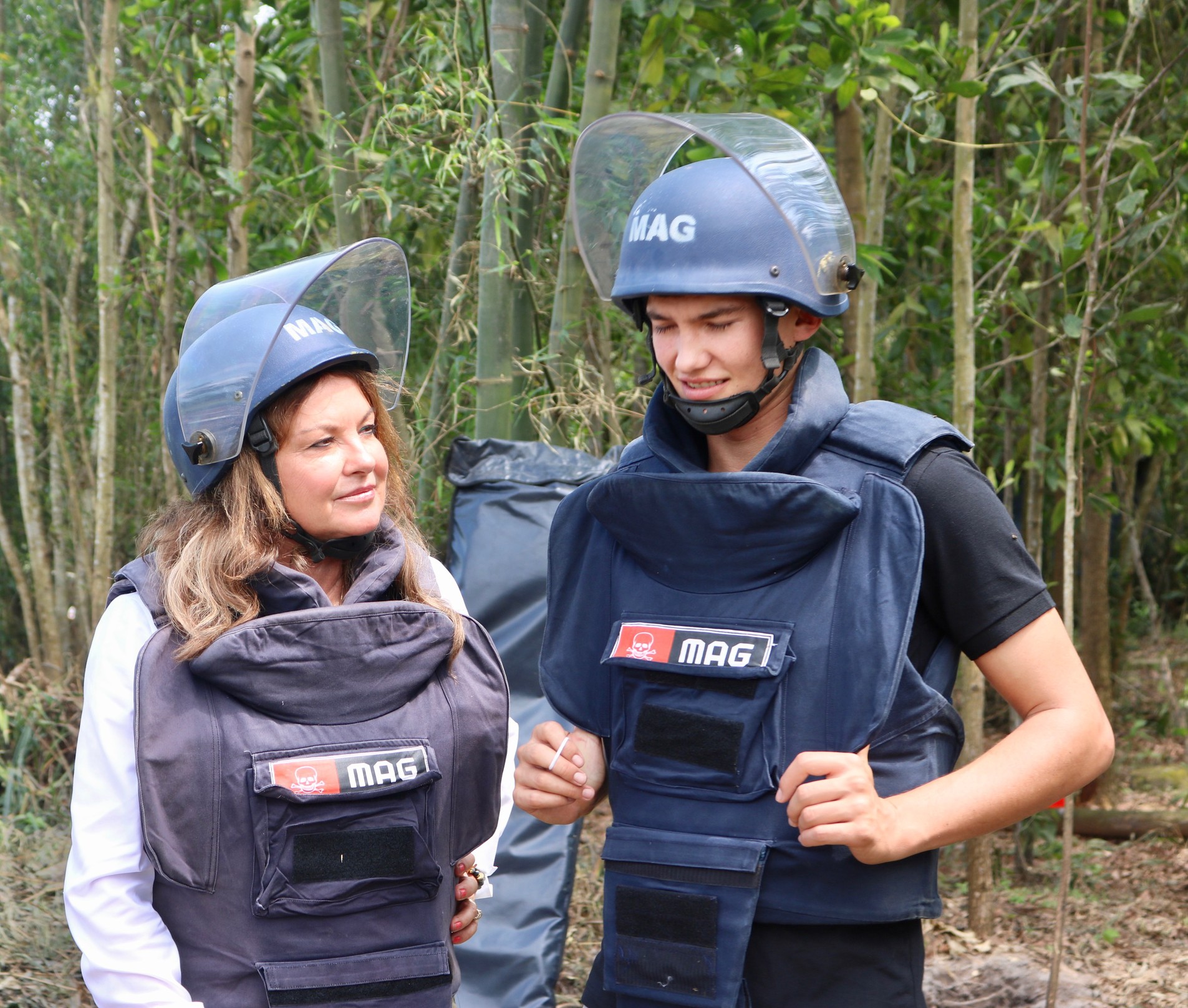 Today, more than 50 countries worldwide are contaminated by landmines and explosive remnants of war, rendering the land where they lay hidden completely unusable. Landmines kill or injure more than 5,000 people each year, about half of them children. There is a strong correlation between the most marginalized and food-insecure communities and contamination with landmines and unexploded ordnance. Kühn works in these afflicted areas to help those most in need, freeing the land that is held hostage to destructive weapons of war.
Today, more than 50 countries worldwide are contaminated by landmines and explosive remnants of war, rendering the land where they lay hidden completely unusable. Landmines kill or injure more than 5,000 people each year, about half of them children. There is a strong correlation between the most marginalized and food-insecure communities and contamination with landmines and unexploded ordnance. Kühn works in these afflicted areas to help those most in need, freeing the land that is held hostage to destructive weapons of war.
“Our mission is to bring opportunity and hope to local populations that once could not walk across their fields for fear of losing a limb or life to these hidden killers which lurk beneath the trusted land. By planting the roots of peace, we restore both the soil and soul, and give rural farmers a chance to build a livelihood, to feed their children and to grow,” said Kühn.
With conflicts proliferating in so many parts of the world, war is a growing threat to farming and food security. An increasing number of nations have found it necessary to confront the daunting challenge of rebuilding food systems, livelihoods and communities after conflict. Kühn’s work transforming “mines to vines” shows the world the vital role agriculture must have in the resilient recovery from conflict and restoration of peace.
Planting the Roots of Peace
Kühn began her efforts to replace mines with vines working out of the basement of her California home. She partnered with vintners like Miljenko “Mike” Grgich, Robert Mondavi and Diane Disney Miller to raise funds to remove landmines left behind by the Croatian War of Independence. As she was working with the Croatian Mine Action Center (CROMAC) to remove mines from seven wine-producing regions of Croatia, Kühn saw how the fear of mines prevented farmers from entering their fields and children from playing freely. While the mine-free, beautiful coastal areas of the country seemed hardly affected, the contaminated interior areas had been devastated by war. Kühn realized that more than mine removal was needed for rural communities to fully recover.
She turned her focus to helping farmers re-establish vineyards and orchards using modern techniques. In Bastica, the former frontline of the war, she assisted farmers with planting 25,000 grapevines and 14,000 apple trees. Her work was instrumental in reviving the renowned Croatian wine industry, as well as apple, cherry and lavender production.
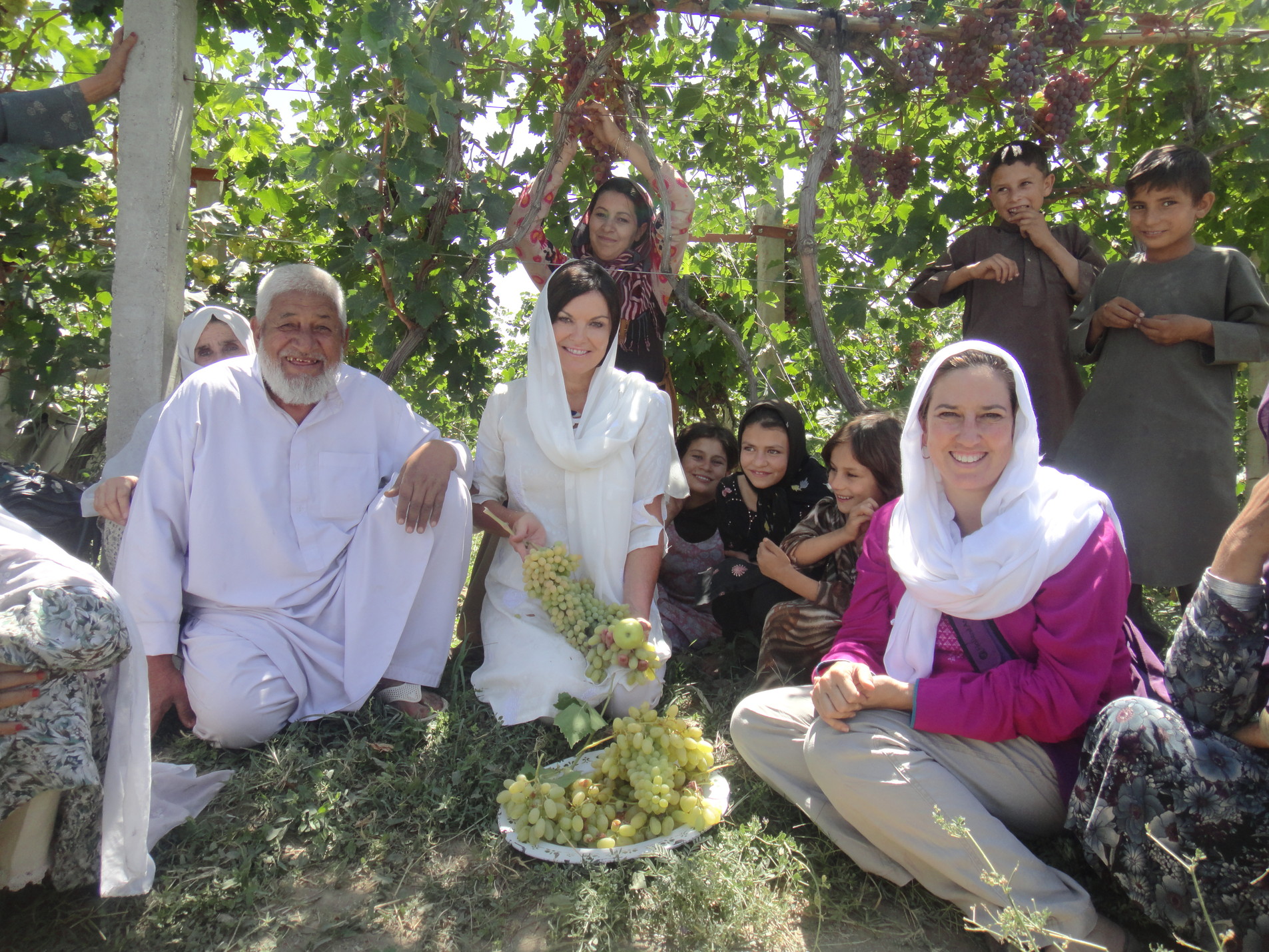 “We cannot rest until the scourge of landmines is eradicated across the globe, as we simultaneously empower farmers and families to take bold footsteps for peace on former war-torn lands,” said Kühn.
“We cannot rest until the scourge of landmines is eradicated across the globe, as we simultaneously empower farmers and families to take bold footsteps for peace on former war-torn lands,” said Kühn.
When she began working in Afghanistan’s Shomali Plain in 2002, she made an unusual request of demining agencies: to remove landmines and unexploded ordnance from the irrigation canals. Though humanitarian demining usually focused first on making residential areas safe, the irrigation canals were vital to food production. After the removal of nearly 100,000 unexploded bombs and mines from irrigation canals and farmland, Kühn and Roots of Peace were able to help farmers replant their fields.
Classic Crops, Modern Methods
Kühn was amazed to learn that there are more than 70 varieties of grapes native to Afghanistan. Out of respect for the culture, she chose to concentrate on producing native table grapes and other traditional crops with improved techniques. Where farmers had been growing grapevines on earthen mounds, Roots of Peace introduced cement trellising that raised the vines off the ground and away from moisture and pests, resulting in doubled yields. More than 1,000 hectares of vineyards have now been trellised using this new technique with 12 local manufacturers supplying materials.
The upheaval of the war resulted in the loss of generational knowledge of traditional farming methods in Afghanistan. Kühn instituted field school programs that trained more than 220,000 farmers in horticultural skills and business management. Many farmers who received training shared what they had learned with other members of their community.
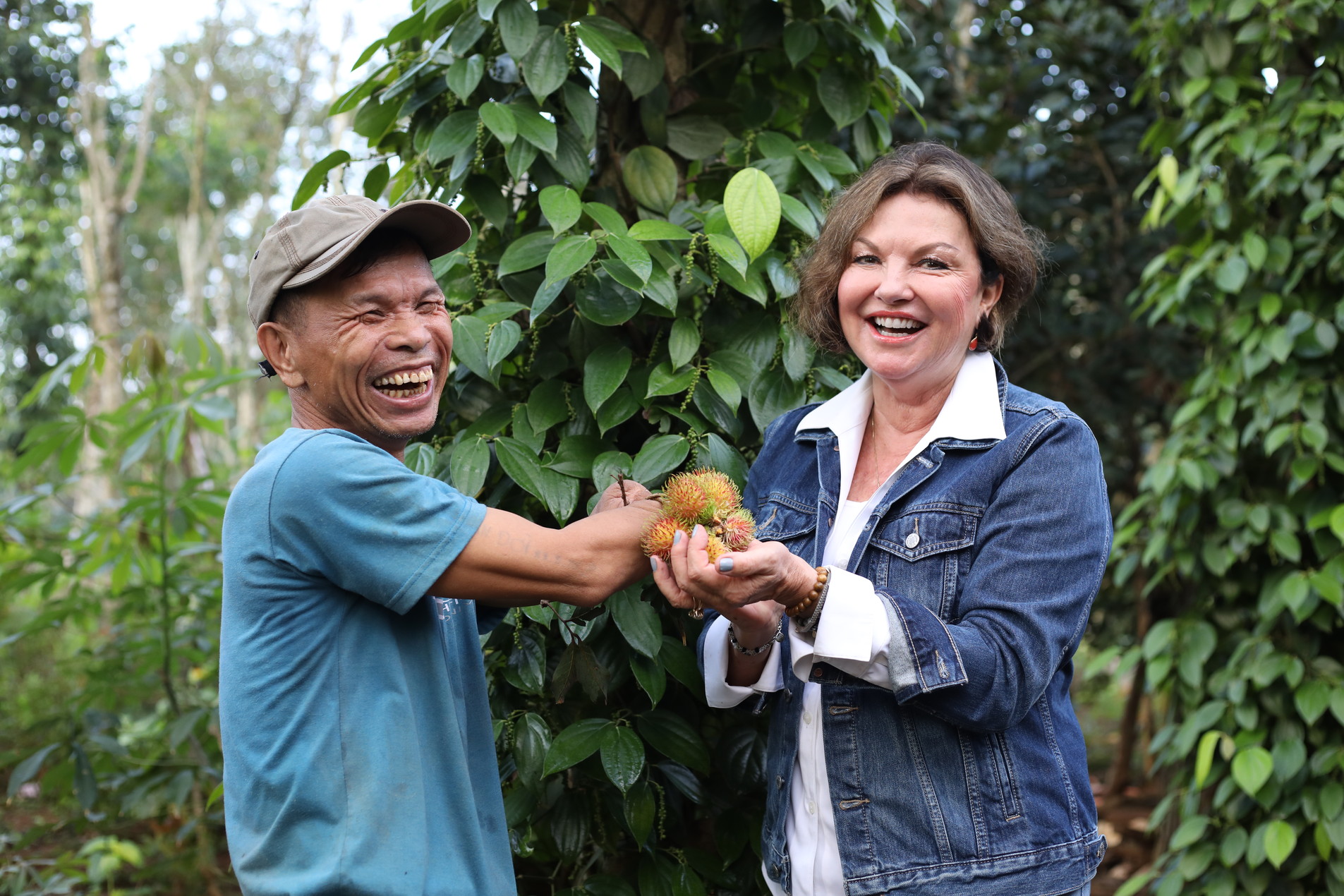 In Quang Tri Province, Vietnam, where at one time more than 80 percent of the land was contaminated with landmines and unexploded ordnance, Kühn partnered with Mines Advisory Group (MAG) to dig up and remove these seeds of destruction from smallholder farmers’ fields. Kühn convinced MAG to go one step further and use their equipment to prepare the plots for planting black pepper trees as it was cleared. This saved farmers many hours of labor and allowed Roots of Peace to help re-establish a near-dead industry. After planting more than 1.6 million black pepper trees and establishing market linkages with the help of Roots of Peace, the region is once again renowned for its high-quality black pepper, exporting over 50 metric tons of high-grade product to new markets in the U.S. More than 3,500 farmers have benefited from this especially profitable crop, and many find a sense of pride in producing a spice that is a part of their cultural heritage.
In Quang Tri Province, Vietnam, where at one time more than 80 percent of the land was contaminated with landmines and unexploded ordnance, Kühn partnered with Mines Advisory Group (MAG) to dig up and remove these seeds of destruction from smallholder farmers’ fields. Kühn convinced MAG to go one step further and use their equipment to prepare the plots for planting black pepper trees as it was cleared. This saved farmers many hours of labor and allowed Roots of Peace to help re-establish a near-dead industry. After planting more than 1.6 million black pepper trees and establishing market linkages with the help of Roots of Peace, the region is once again renowned for its high-quality black pepper, exporting over 50 metric tons of high-grade product to new markets in the U.S. More than 3,500 farmers have benefited from this especially profitable crop, and many find a sense of pride in producing a spice that is a part of their cultural heritage.
Economics of Peace
Increasing farmers’ incomes is an important part of Kühn’s work to make farming a resilient and sustainable livelihood. When starting work in a new area where mines had been removed, Roots of Peace prioritized conducting feasibility studies of possible high-value crops. In Vietnam, they determined that cacao, intercropped with established cashews to provide shade, would give farmers the best return and allow them to keep their cashew trees, which were no longer sufficiently profitable on their own. The results of the project, which planted more than 400,000 trees, convinced the Vietnamese government and their agricultural extension agents to adopt Kühn’s methods.
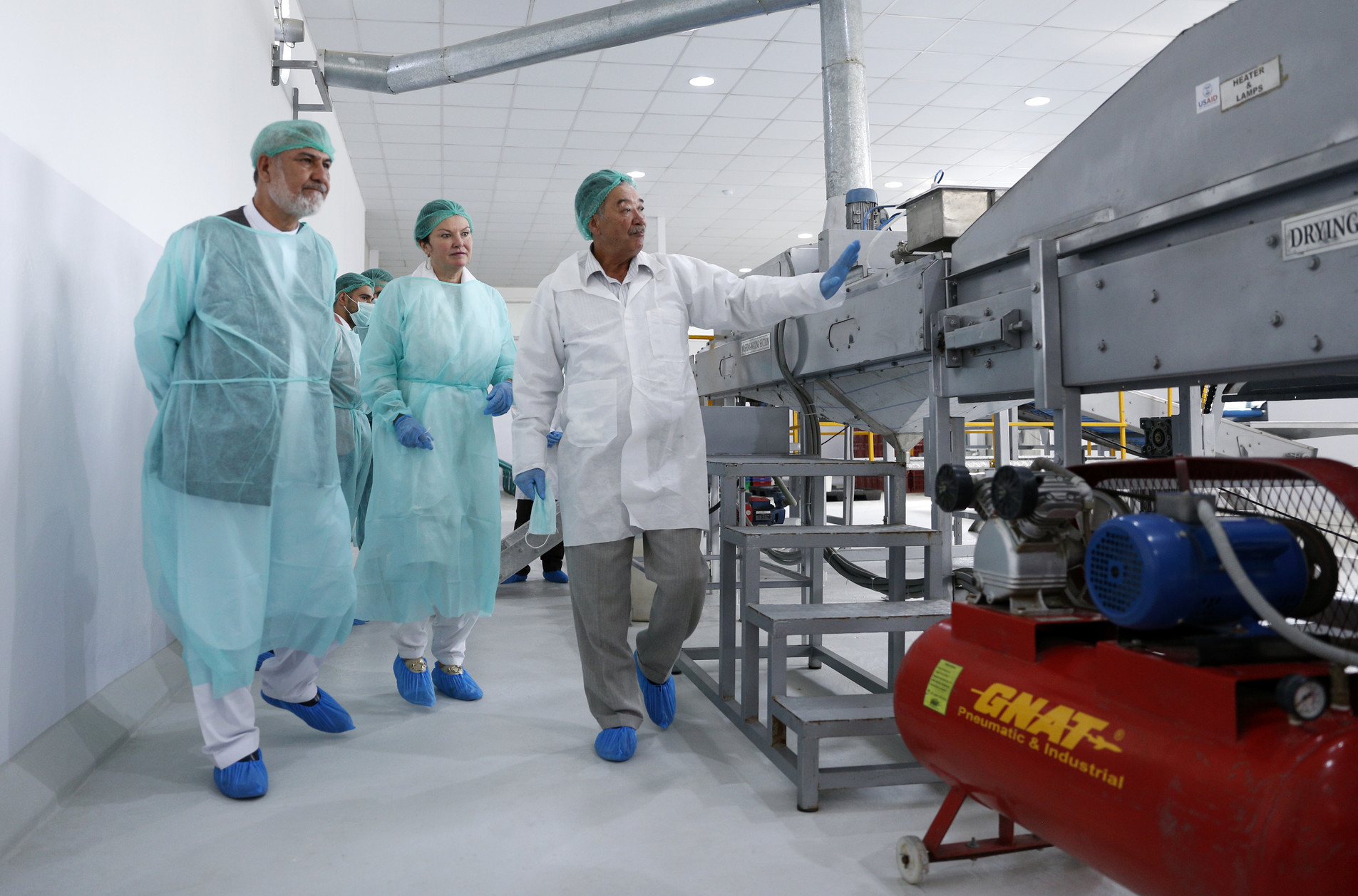 Kühn designed a strategy for promoting high value commodities by building agricultural value chains from production and processing to market support and distribution. In Afghanistan, Roots of Peace worked with farmers — including over 5,000 women — to increase the yield and quality of a wide variety of fruits, nuts and spices, planting more than six million food crop trees. They provided more than $1.5 million in grants to build drying, processing and cold storage facilities as well as training in handling, sorting and packaging. Kühn led trade missions to re-establish export markets for these products in Dubai, Pakistan and India. Her efforts facilitated agricultural exports worth over $491 million as well as a four-fold increase in farm household income. In doing so, Roots of Peace has begun to restore Afghanistan as the “Garden of Central Asia.”
Kühn designed a strategy for promoting high value commodities by building agricultural value chains from production and processing to market support and distribution. In Afghanistan, Roots of Peace worked with farmers — including over 5,000 women — to increase the yield and quality of a wide variety of fruits, nuts and spices, planting more than six million food crop trees. They provided more than $1.5 million in grants to build drying, processing and cold storage facilities as well as training in handling, sorting and packaging. Kühn led trade missions to re-establish export markets for these products in Dubai, Pakistan and India. Her efforts facilitated agricultural exports worth over $491 million as well as a four-fold increase in farm household income. In doing so, Roots of Peace has begun to restore Afghanistan as the “Garden of Central Asia.”
Farmer-Focused
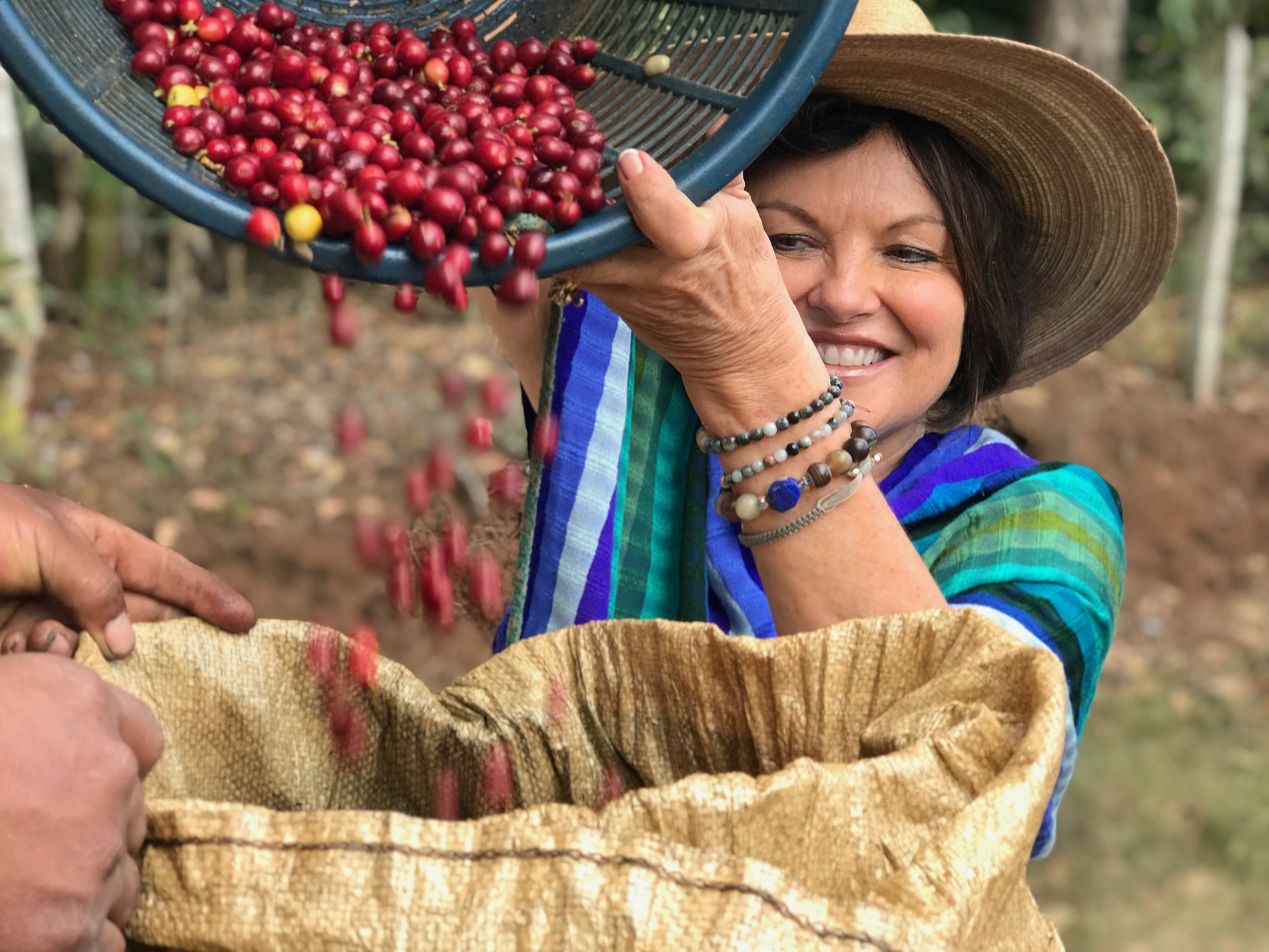 Kühn led Roots of Peace through the government take-over of the Taliban in 2021 to safely continue their critical agricultural work in all provinces of Afghanistan. Because of her uncommon success in the midst of upheaval, the U.S. government and the United Nations Development Programme provided funding for Roots of Peace to continue sustainable agricultural programs. These programs, which have provided a viable alternative to poppy production, are in large part successful because of the trust Kühn has painstakingly built with the Afghan people. The resulting economic resilience has allowed communities to resist further calls to violence, making her efforts instrumental to peacebuilding in the country.
Kühn led Roots of Peace through the government take-over of the Taliban in 2021 to safely continue their critical agricultural work in all provinces of Afghanistan. Because of her uncommon success in the midst of upheaval, the U.S. government and the United Nations Development Programme provided funding for Roots of Peace to continue sustainable agricultural programs. These programs, which have provided a viable alternative to poppy production, are in large part successful because of the trust Kühn has painstakingly built with the Afghan people. The resulting economic resilience has allowed communities to resist further calls to violence, making her efforts instrumental to peacebuilding in the country.
“When people are desperate, when they can’t feed their families, that is when war breaks out all over the world. So we are doubling down on our deepest commitment,” said Kühn. “Roots of Peace serves no flag; we serve the farmer.”
Since the start of the war in Ukraine, over 30 percent of the country’s agricultural land has been mined. Kühn has partnered with Rotary International to raise funds to begin restoring vineyards and value chains in Mykolaiv, Ukraine, as soon as it becomes possible to remove the landmines. She plans to implement the measures that have been successful in other countries where she has worked to build an economic framework for agricultural recovery from the war.
A Marin County Mother
Heidi Kühn is the fifth generation of her family to live in the state of California, where her pioneering ancestors settled as farmers. Her family’s history and values instilled in her a respect for the land and the people it sustains. In high school, she competed in the high dive, which gave her the confidence to take the plunge in places where others would hesitate.
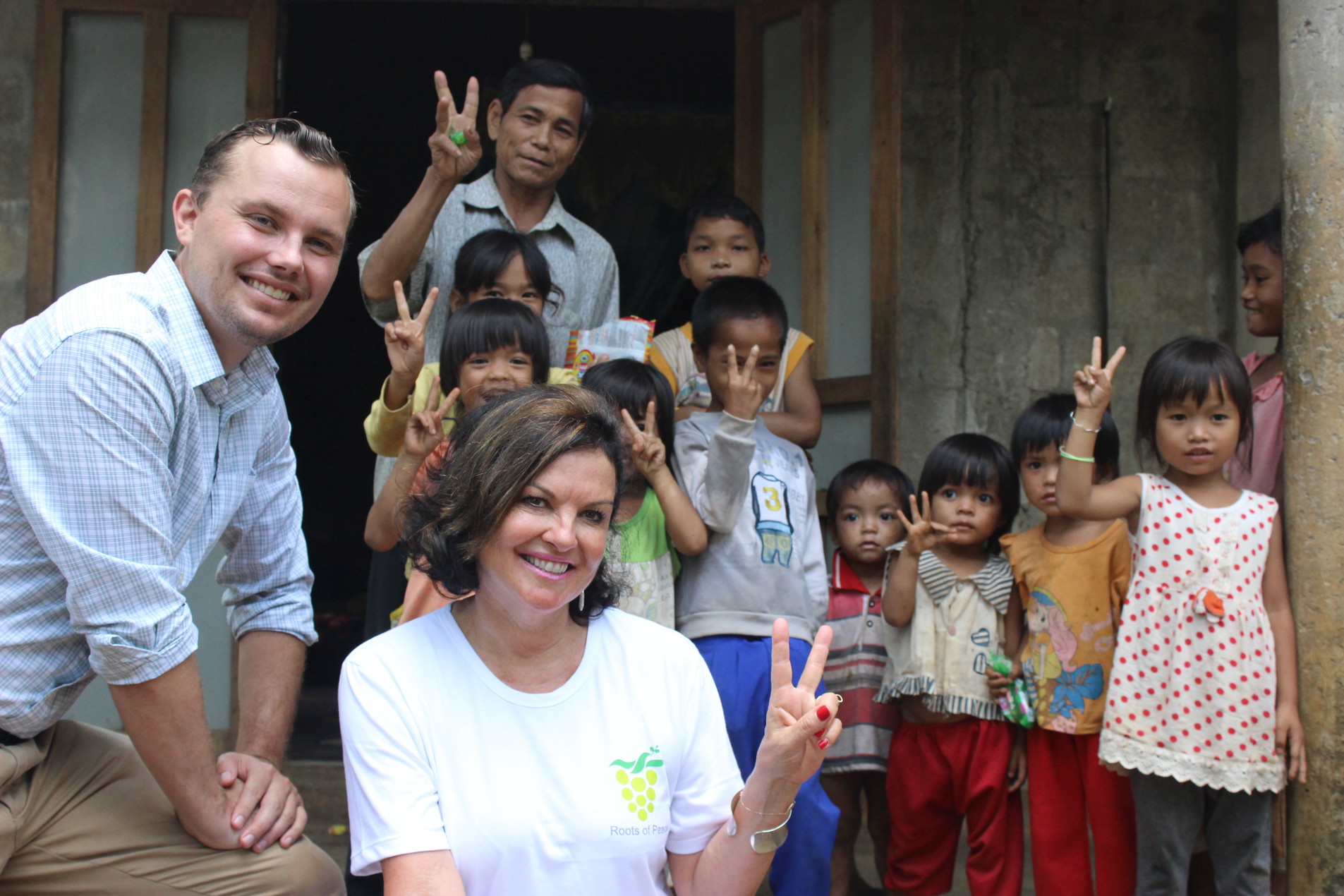 She earned a degree in Political Economics from the University of California, Berkeley, where she was inspired by the peace movement of the 1970s. There, she also met her husband, Gary. Following Kühn’s lead, he and their four children, Brooks, Tucker, Kyleigh and Christian, all became involved in Roots of Peace out of a desire to make a difference and uplift others.
She earned a degree in Political Economics from the University of California, Berkeley, where she was inspired by the peace movement of the 1970s. There, she also met her husband, Gary. Following Kühn’s lead, he and their four children, Brooks, Tucker, Kyleigh and Christian, all became involved in Roots of Peace out of a desire to make a difference and uplift others.
While living in Juneau, Alaska, she founded and owned the television news company NewsLink International and reported for ABC, CBS, CNN, NBC, Nippon Television and others on the Exxon Valdez oil spill and thawing relations between the U.S. and the Soviet Union. As the first U.S. reporter to visit the eastern region of the Soviet Union, her news stories focused on pathways to peace between the two superpowers.
Her career in news was abruptly halted by her diagnosis with cancer. Kühn emerged from successful treatment with a sense of purpose, more motivated than ever to blaze trails for peace.
Kühn saw an opportunity to do this work while watching a report on Diana, Princess of Wales, walking in minefields in Angola. The plight of the people, especially mothers and children, living in areas contaminated with landmines moved her to begin raising awareness and funding for the issue, and Roots of Peace was born. In 1997, she witnessed 164 nations sign and ratify the Ottawa Treaty, an international agreement to eliminate anti-personnel landmines.
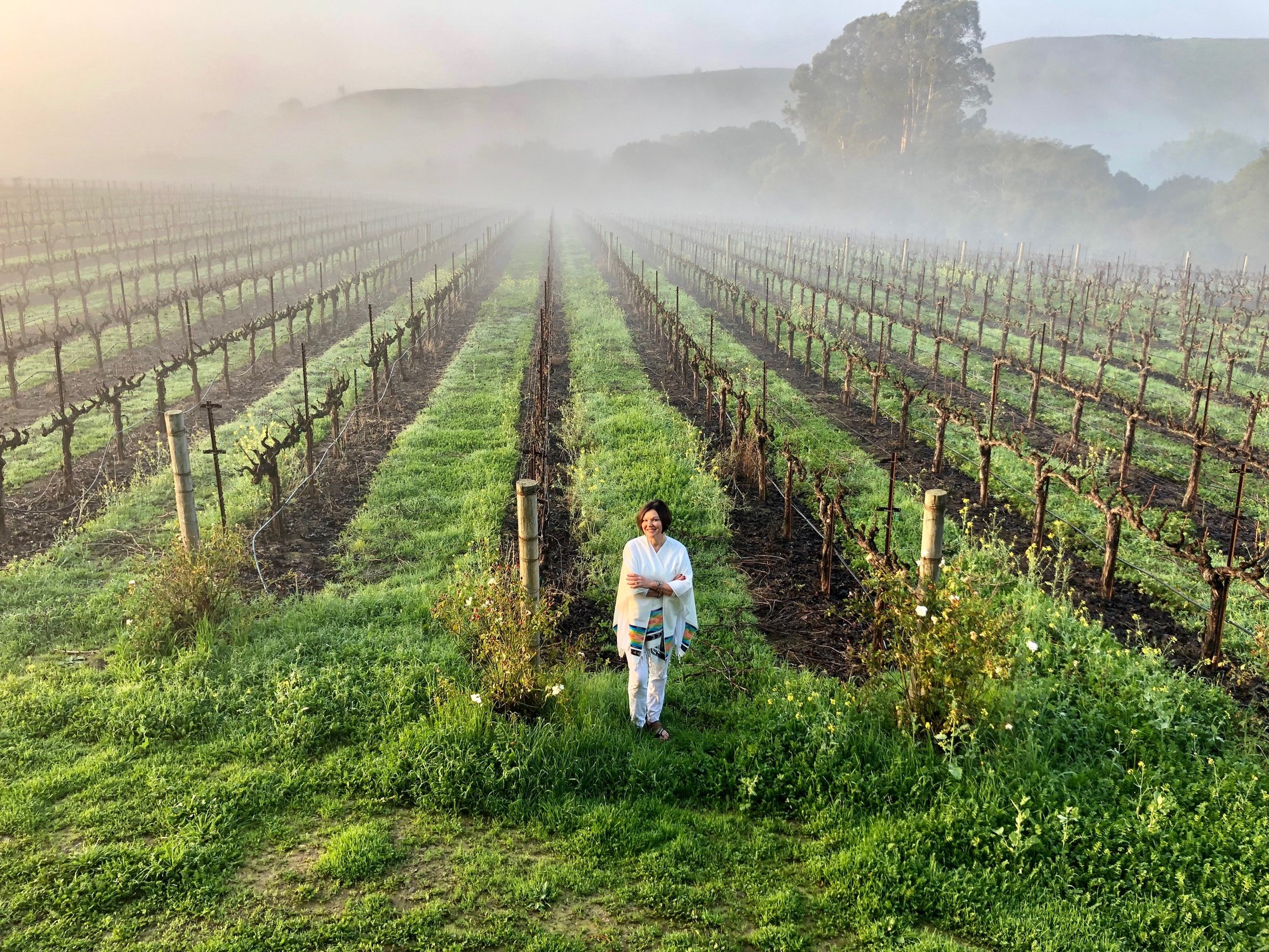 In 2010, Kühn was invited by 11-year-old Israeli landmine survivor Daniel Yuval to work on the issue of landmines in his homeland, where tensions between Israel and Palestinians had stymied mine removal operations. Through arranging talks with the Israeli government, Palestinian Authority, U.S. Department of State, and United Nations Mine Action Service, Kühn received approval to arrange the first bilateral humanitarian demining in the West Bank. The project brought together Israeli and Palestinian deminers in the village of Husan, a Muslim community located four miles from Bethlehem.
In 2010, Kühn was invited by 11-year-old Israeli landmine survivor Daniel Yuval to work on the issue of landmines in his homeland, where tensions between Israel and Palestinians had stymied mine removal operations. Through arranging talks with the Israeli government, Palestinian Authority, U.S. Department of State, and United Nations Mine Action Service, Kühn received approval to arrange the first bilateral humanitarian demining in the West Bank. The project brought together Israeli and Palestinian deminers in the village of Husan, a Muslim community located four miles from Bethlehem.
This interfaith, bilateral, humanitarian action to remove minefields is symbolic of Kühn’s determination to bridge divides and pioneer paths towards peace. Her greatest goal through Roots of Peace is to empower farmers to feed their families and yield a “harvest of hope.”
"We aren't just turning mines into vines," Kühn said. "We are providing a business model for peace. Peace is the hardest aspiration, but it's also the most rewarding. We cannot give up."
Additional Links
25 Anniversary of Roots of Peace | Video
Roots of Peace Celebrates 20 Years in Afghanistan


